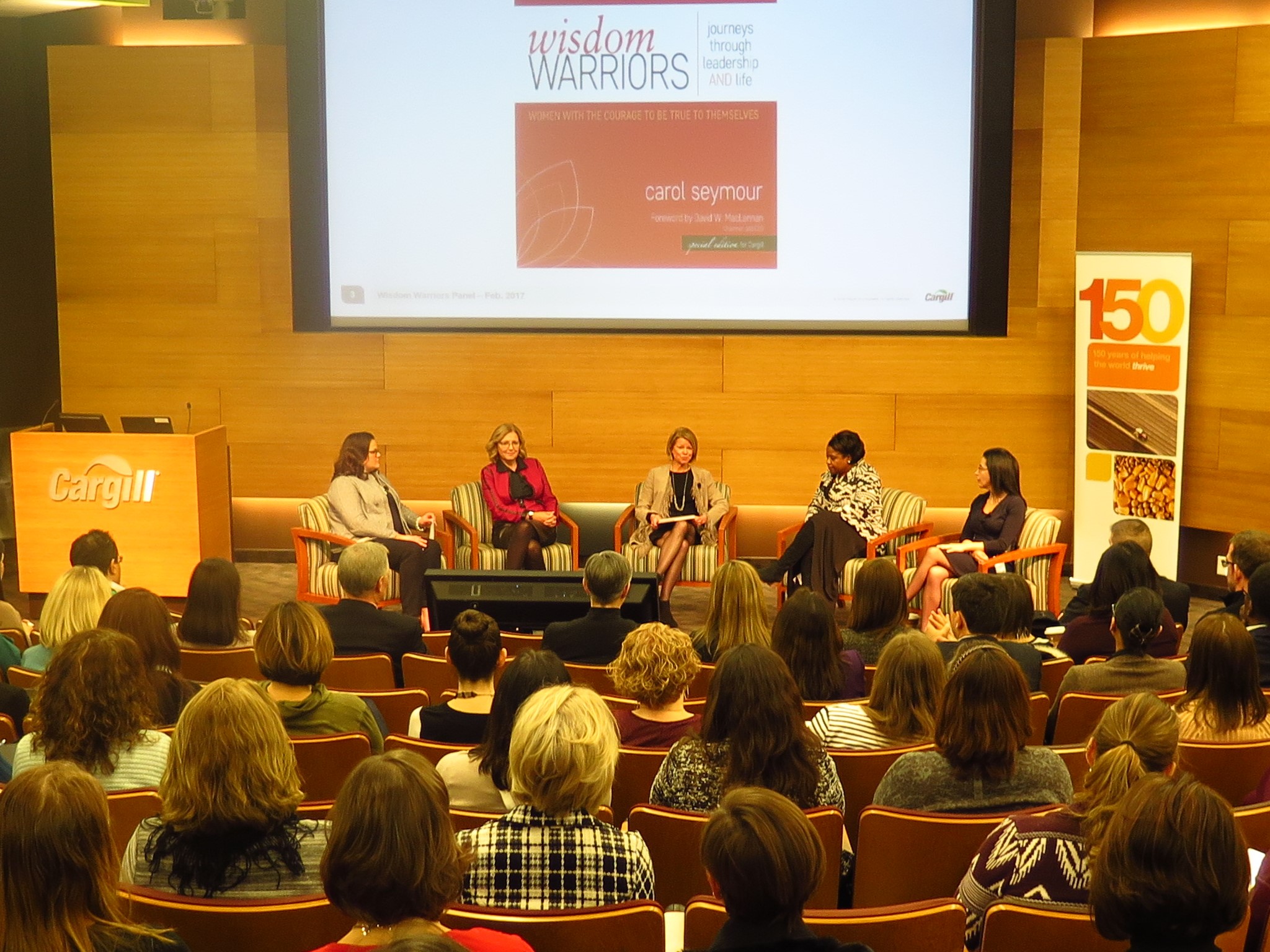
One year into the pandemic, it’s almost hard to imagine a time when five women leaders all sat together on the same stage, speaking to a roomful of women in leadership positions. But that’s what happened in February of 2017 when Signature Leaders’ Founder and CEO Carol Seymour anchored a panel discussion as part of Cargill’s series of initiatives leading up to International Women’s Day.
Cargill had sponsored a custom edition of Carol’s book, Wisdom Warriors, then assembled a panel to talk about the challenges, opportunities, and experiences of women leaders.
In addition to Carol, the panelists included:
- Jen Shomenta Maki, Vice President, Managing Director, North America Global Edible Oils Solutions at Cargill
- LeighAnne Baker, former CHRO of Cargill
- Sonya Roberts, President and Group Leader, Cargill Salt
- Pilar Cruz, President and Group Leader, Cargill Aqua Nutrition
The discussion ranged from topics including personal energy and identity to the value of cognitive diversity.
During this year’s Women’s History Month, as we look forward with optimism to the possibility of having such in-person experiences again, these excerpts from that 2017 discussion resonated with us. They’re still great leadership lessons today.
On the value of cognitive diversity…
Carol: You know, I named the Signature Program “signature” because no two signatures are alike. I can’t sign your name, and you can’t sign my name, and everybody brings a unique gift. It’s not gender diversity. Right? It’s just diversity.
The head of engineering for Facebook talks about cognitive diversity. I like that because it doesn’t bracket anything. So I think cognitive diversity — what we all bring from our experiences and our mindsets, and how we view things — that’s what’s going to drive innovation and growth in companies.
On the effort of fitting in…
Carol: If you can’t be true to yourself, if you always are trying to fit in, however subtle that may be, that changes how you arrive at work. … I was [talking to] the head of the supply chain for Ann Inc., Ann Taylor, which is a female organization, [with a] female CEO. She said, “I didn’t realize how lucky I was. When I get to the office in the morning, I get to think about the problems I’m going to solve. Most of the women in [the Signature] program — industrial manufacturing, other industries that are not very female dominated — they have to think about how they fit in before they even get to solve the day’s business problems.”
On losing the trees for the forest…
Carol: One of our faculty members, who’s a board member for an energy company, said to the CEO, “You don’t have a tree problem, you have a forest problem. You have great trees in this organization. The forest crowds them out.” I think that’s one of the first challenges: How do you fit in? How do you have the courage to be yourself?
On lessons from the “ice queen”…
Carol: Kathy Fortmann [when she was an engineer at DuPont] observed that the perception was, when two females were talking in the hallway, it was gossip, but when two men were talking in the hallway, it was networking. So she decided she wasn’t going to chit-chat in the hallway, and all of a sudden, they started calling her the “ice queen.” Fortunately, one of her colleagues said to her, “Cathy, do you realize they’re calling you the ice queen?” That was because she was trying to fit in and not be comfortable as who she is.
On holding yourself back…
LeighAnne Baker: A lot of times, we hold back ourselves by our own thinking. … Why am I limiting myself? I’m lucky to be here, but I’m also really good at what I do. … What it means for me to be on the executive team is that I bring all of my experiences, my relationships, my collaborations with people like Carol. I bring my education, I bring my work experiences… I bring all of that to help shape Cargill’s future vision.
On the myth of work-life balance…
LeighAnne Baker: There’s no work-life balance per se, because that’s a stable state. Sometimes work wins, and sometimes life or the family wins.
Sonya Roberts: I just say, “This is my life.” And it includes my work. It includes what I do with my family; it includes taking care of my mother. It’s my life. And so I manage it accordingly. I’ve worked when my mom was ill in the rehab center. I can take calls from there and do work that I need to do there. When my daughter wants me to go and be the one to drop her off at hockey, I can go do that. I know where most hockey rinks have an office, and I can go in there while she’s getting ready to go on the ice. It’s my life, and I manage my calendar accordingly.
How Are You Making History?
How are you making history at your company or in your career? We’d love to hear your stories. Contact us to let us know.
For more video clips from this and other talks by Carol, subscribe to our YouTube channel.
